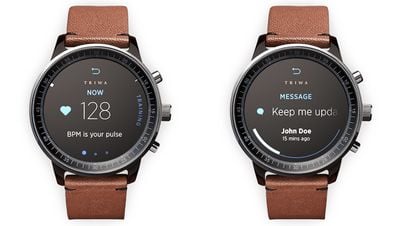iWatch Rumored to Include UV Light Exposure Sensor
Apple's long-rumored "iWatch" smartwatch may include a UV light exposure sensor provided by Texas-based Silicon Labs, according to a new research note from Barclays analyst Blayne Curtis (via AppleInsider). The digital ultraviolet sensor, which was announced in February, is described by Silicon Labs as "ideal for activity-tracking wrist and arm bands, smart watches and smartphone handsets." In addition to tracking UV sun exposure, the sensor is also said to track heart/pulse rate and blood oximetry levels and provide proximity and gesture control.

These chips measure UV exposure to aid those with elevated risk of sunburn or just a general concern about excessive sun exposure, and we believe they may be of appealing to OEMs looking to differentiate in a crowded market. To that end, while these products have seen little public hype thus far, we believe SLAB has a win in Apple’s upcoming iWatch (late 2H14 or early 2015).
Past reports have indicated that Apple is preparing to include the ability to monitor a number of health-related metrics in the iWatch such as heart rate, sleep activity, movement, perspiration levels, and skin temperature. Apple is also said to be developing a "Healthbook" app for iOS 8 which would help the iWatch monitor and track health statistics like weight, heart rate, calories and step counts in conjunction with the iPhone.
Over the past year, Apple has also hired a number of health experts in fields related to heart rate monitoring and fitness tracking, including two executives from pulse-oximetry company Masimo and others from C8 MediSensors, a company that develops non-invasive blood monitoring sensors.
While details on the iWatch have been mostly limited, more information on the product is likely to be revealed as the product's release grows closer. It is unknown when Apple plans to release the iWatch itself, but a fall release date alongside iOS 8 and the next-generation iPhone is likely.
Popular Stories
Apple is preparing a "bold" new iPhone Pro model for the iPhone's 20th anniversary in 2027, according to Bloomberg's Mark Gurman. As part of what's being described as a "major shake-up," Apple is said to be developing a design that makes more extensive use of glass – and this could point directly to the display itself.
Here's the case for Apple releasing a truly all-screen iPhone with no...
While the iPhone 17 Pro and iPhone 17 Pro Max are not expected to launch until September, there are already plenty of rumors about the devices.
Subscribe to the MacRumors YouTube channel for more videos.
Below, we recap key changes rumored for the iPhone 17 Pro models as of April 2025:
Aluminum frame: iPhone 17 Pro models are rumored to have an aluminum frame, whereas the iPhone 15 Pro and ...
If you have been experiencing issues with wireless CarPlay in your vehicle lately, it was likely due to a software bug that has now been fixed.
Apple released iOS 18.4.1 today, and the update's release notes say it "addresses a rare issue that prevents wireless CarPlay connection in certain vehicles."
If wireless CarPlay was acting up for you, updating your iPhone to iOS 18.4.1 should...
The first iOS 19 beta is less than two months away, and there are already a handful of new features that are expected with the update.
Apple should release the first iOS 19 beta to developers immediately following the WWDC 2025 keynote, which is scheduled for Monday, June 9. Following beta testing, the update should be released to the general public in September.
Below, we recap the key...
Apple's iPhone development roadmap runs several years into the future and the company is continually working with suppliers on several successive iPhone models simultaneously, which is why we often get rumored features months ahead of launch. The iPhone 17 series is no different, and we already have a good idea of what to expect from Apple's 2025 smartphone lineup.
If you skipped the iPhone...
Apple may have updated several iPads and Macs late last year and early this year, but there are still multiple new devices that we're looking forward to seeing in 2025. Most will come in September or October, but there could be a few surprises before then.
We've rounded up a list of everything that we're still waiting to see from Apple in 2025.
iPhone 17, 17 Air, and 17 Pro - We get...
Despite being more than two years old, Apple's AirPods Pro 2 still dominate the premium wireless‑earbud space, thanks to a potent mix of top‑tier audio, class‑leading noise cancellation, and Apple's habit of delivering major new features through software updates. With AirPods Pro 3 widely expected to arrive in 2025, prospective buyers now face a familiar dilemma: snap up the proven...
Apple today released iOS 18.4.1 and iPadOS 18.4.1, minor updates to the iOS 18 and iPadOS 18 operating systems that came out last September. iOS 18.4.1 and iPadOS 18.4.1 come two weeks after the launch of iOS 18.4 and iPadOS 18.4.
The new software can be downloaded on eligible iPhones and iPads over-the-air by going to Settings > General > Software Update.
There have been complaints about ...
Apple today updated its vintage products list to add the 2018 Mac mini and the iPhone 6s, devices that will get more limited service and repairs now that they are considered vintage.
The iPhone 6s initially launched in 2015, but Apple kept it around as a low-cost device until 2018, which is why it is only now being added to the vintage list. The iPhone 6s had Apple's A9 chip, and it was...
























